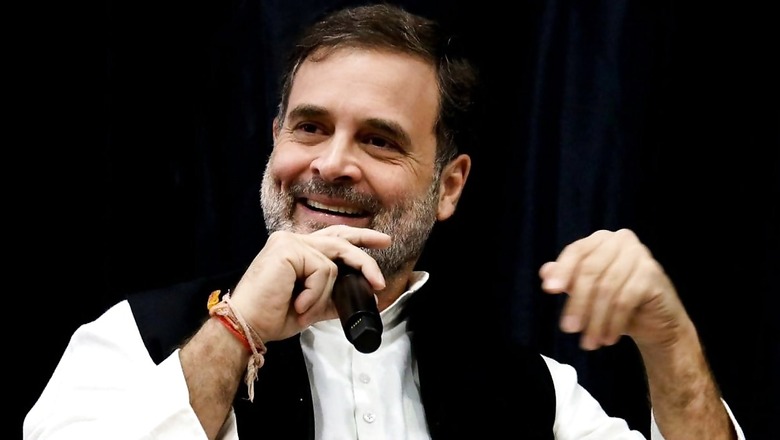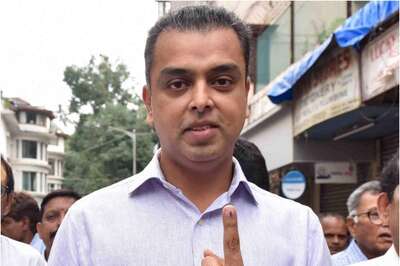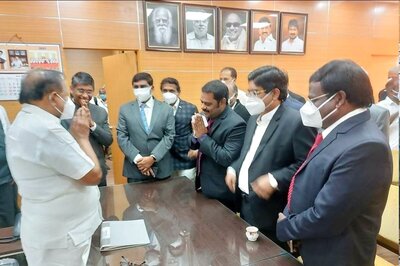
views
The moral decline of a nation is often preceded by a decline in the moral character of its leaders.
— Unknown
If one follows the political trajectory of Rahul Gandhi, one would find an unmistakable deterioration in his politics over the years. From an initially naive politician with an inherent sense of entitlement to now an overtly manipulative one, his politics has been deeply disconcerting, especially given the fact that he now holds the position of the Leader of Opposition in the Lok Sabha.
Recently, during a purported outreach campaign in the US, he made baseless and inflammatory remarks about the state of religious freedom in India. Despite being fully aware of the sensitivity involved, he recklessly raked up the issue of the rights of the Sikh community in India, falsely claiming that they face religious bias and hostility from the ruling establishment. It is patently clear that Rahul Gandhi is playing a deliberate and dangerous game of deception, and he is not doing so out of ignorance, he knows exactly what he is doing and the potential implications thereof.
Like a politician driven solely by an insatiable lust for power, his actions betray a carefully thought-out plan to create a negative impression of India’s current ruling establishment and undermine its democratic institutions by spreading blatant falsehoods and casting unfounded aspersions. His calculated approach aims to erode trust in India’s democracy and its institutions, while presenting a distorted narrative that serves his political interests.
Besides, there are credible concerns that Rahul Gandhi is willingly allowing himself to be exploited by anti-Hindu and anti-India elements, both within the country and abroad, whose sole interest lies in maintaining India’s instability and keeping it on the boil. In a stark illustration of his willingness to appease anti-India forces, Rahul Gandhi held a meeting with Ilhan Omar, a US Democratic Party leader, notorious for her vociferous anti-India stance. Omar’s actions have been consistently inimical to Indian interests, as evidenced by her introduction of anti-India resolutions in the US Congress, her opposition to the abrogation of Article 370, her deliberate violation of India’s sovereignty by visiting Pakistan-occupied Kashmir (PoK) and engaging with Pakistani leaders to discuss alleged ‘Islamophobia’ in India.
Besides, there have been several media reports claiming Rahul Gandhi’s links with George Soros, billionaire US investor known for being critical of India. Rahul Gandhi has repeatedly engaged with anti-India elements to the detriment of India’s national interest. His rhetoric, which aligns with the dominant narrative in Western liberal circles, has been systematically amplified through various platforms, perpetuating a sinister and divisive agenda.
Rahul Gandhi’s behaviour and attitude seem to betray a deep-seated feeling of superiority, characteristic of a politician who embodies the quintessential feudal mindset. He appears to believe that he is born to rule, and when denied his perceived ‘birthright’ to power, he becomes incensed, unleashing dangerous ideas and intentions in his anger and exasperation.
Despite having a section of the media and intelligentsia serve as his cheerleaders, Rahul Gandhi’s political career, spanning over two decades, has been marred by countless failures. This has led to growing impatience, culminating in a precipitous moral decline in his politics. He seems to have developed a penchant for unrestrained falsehoods, unsubstantiated allegations and a constant urge to vilify the country’s political process. We have seen him constantly taking an anti-India stand, labelling the most outlandish allegations against the government. During the recent Lok Sabha polls, Rahul Gandhi spread misinformation by falsely claiming that the Constitution and reservation system would be dismantled if the BJP were re-elected to power. Gandhi’s approach appears to be inspired by the propaganda tactics of Joseph Goebbels, who famously stated that repeated lies can become accepted as truth.
If we carefully examine the current communication strategy of Rahul Gandhi and his team, it involves co-opting a victimhood mentality (often fabricated with no basis in reality) among a large section of the masses, exploiting it to further his own political agenda. He selectively takes up issues that can create hysteria among the people, often neglecting their wider repercussions. The most troubling aspect of this strategy is that, although it initially generates a reasonable support base, it ends up making things more dire in the long run without achieving any substantive progress.
Rahul Gandhi, who presents himself as the messiah of the poor and downtrodden by championing their rights, conveniently forgets that most of the issues he now vocally talks about were created by his own party during its six-decade rule. His hypocrisy and historical amnesia are quite extraordinary. Edmund Burke, British conservative politician and thinker, said, “Hypocrisy can afford to be magnificent in its promises, for never intending to go beyond promise, it costs nothing.”
The problem with Rahul Gandhi is that he wants real power sans any real responsibility. The biggest mistake he is making is that, in his eagerness to undermine his political opponents, he is deliberately delegitimising and discrediting the political process as a whole. In his zeal to vilify the government, he is eroding the sanctity of institutions that have been built over time on the foundation of the trust of the people.
Lastly, for decades, India’s robust democratic tradition has emphasised the importance of keeping national interests above partisan politics, especially when it comes to running down the government on foreign soil. This unwritten rule has helped maintain a sense of national unity and cohesion, even in the face of political disagreements. However, in recent years, this tradition seems to have been eroded.
It’s essential for India’s democratic health to strike a balance between robust political opposition and national unity, ensuring that criticisms are constructive and don’t compromise the country’s interests or reputation globally.
The writer is head, policy research, Bihar BJP. The views expressed in the above piece are personal and solely those of the author. They do not necessarily reflect News18’s views.

















Comments
0 comment